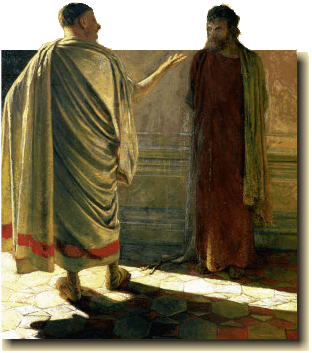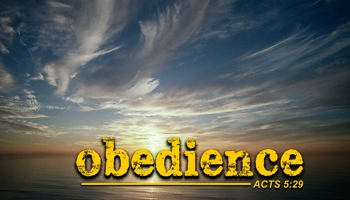
|
| to Pilate "...My Kingdom is not of the world." |
by haRold Smith
a citizen of the Commonwealth
(Ephesians 2:12)
"My kingdom is not of this world. If my kingdom were of this world, my servants would have been fighting that I might not be delivered over to the Jews. But my kingdom is not from the world." John 18:36
"For to this you have been called, because Yeshua also suffered for you, leaving you an example, so that you might follow in His steps. He committed no sin, neither was guile found in his mouth. When he was reviled, he did not revile in return; when he suffered, he did not threaten, but continued entrusting Himself to Him who judges justly." 1Peter 2:21-23
After the last article, Cultural Depravity (click on highlighted words to view content), Julie wrote to ask, "I'm taking exception to the point that defending oneself is somehow "returning evil with evil". I dare say that our nation was founded by an "armed insurrection", too. While I certainly agree that we need to be led by the Holy Spirit; if, for example, I see someone attacking a member of my family, I'm going to defend them to the best of my ability and I don't believe that scripture anywhere supports calling that a sin. What do you do with the whole front half of the Bible? You know, where YHVH, the one that supposedly doesn't change, took people into violent battle repeatedly - pretend that part of the Bible doesn't exist? There is a biblical self-defense precedent in the Mosaic Law (Exodus 22:2-3) - and if all that OT isn't enough, how about Luke 22:35-39 in the NT? I don't pretend to completely understand all of this passage, but it seems Yeshua expected them to have at least some swords, expecting them to carry them on their persons when they went from the city to the prayer meeting. He even said to sell a garment to buy a sword. That doesn't sound like Yeshua was expecting them to be pacifist all the time but to defend themselves against worldly involvement in their lives. What this all says to me is that YHVH has previously set precedents for fighting - or not. When He was with you, you won - if He wasn't, you lost. And I believe it probably still works that way, considering I believe He doesn't change. And I believe He can tell us, through His Spirit whether He would want us to fight or not and, if so, how to fight in any specific situation. That's why, for me, I personally currently can't buy into the whole 'complete pacifism is the only way to follow Yeshua' message.
"The second point that I'm having a little trouble with is your statement that, "To attempt to apply those standards to those who have not subscribed to YHVH's covenant is futile because they belong to another culture, another kingdom where the standard is different." Hey, remember us? We, the Christians live here, too. It's our culture, too! Standing up for what we believe in, and doing our best to speak the truth in love - is that what you're talking about when you say, "to apply those standards to those who have not subscribed to YHVH's covenant..."? Is saying something or doing something now considered an attempt to "apply those standards"? The world is SURELY trying to convince us of that very fact so we will stay silent, and ineffectual."
Taking the second point first, the thrust of the article was to point out that if someone is a citizen of YHVH's Kingdom - then, by definition, they cannot be a part of the culture of a religion or of any other worldly nation as well. To be a saint in His Kingdom is to be holy (Hebrew kodesh) which means to be "set apart, separate" from the world. Separate from the world means all that is in the world - including the cultures and religions of men. When we receive ruach hakodesh, the spirit of holiness, of set apartness we receive the seal of His Kingdom (John 3:33, 2Timothy 2:19). So, no - in spite of what many believe, scripturally the culture of America is not the culture of the Kingdom of YHVH. This is what it means to be in the world but not part of it. To simply speak plainly, when you consider the Greek word apostasia (translated the "falling away" or "rebellion" depending on which English version is used - the word "apostasy" is not actually found in scripture) spoken of in 2Thessalonians 2:1-12 has as its main ingredient the mystery of "lawLESSness" (Greek anomia) and that the word "law" does not mean the regulations of men but of Torah; it becomes apparent that those promoters, those leaders of the religion Christianity, the Church, fit that description. The harshest words Yeshua ever used toward anyone were to the religious leaders of His day. He called them "snakes" because, not only do they shut up the Kingdom from themselves, but from all those who follow their teaching as well. The other characteristic of the apostasy mentioned is a rejection of "the love of the Truth" (v10). The Words of YHVH are Truth and the decision to embrace His Words or not applies to every individual (Matthew 5:17-23). This is why, after being immersed in Christianity for the better part of 30 years; today, my declaration is that I am not a Christian. I am a follower of the Way of the Hebrew Messiah, Yeshua - as was the Hebrew apostle Sha'ul.
Addressing the first point, If YHVH's Words are powerless to change the determined hearts of men to do as they please and prevent them from behavior aligned against Him, what makes anyone think secular laws have the power to do what His Law could not? The Supreme Court did not write a new law concerning homosexual marriage; instead, it removed a law designed to control the behavior of men. It removed a law so that American citizens are free to openly display their heart of rebellion against YHVH. This decision did not change the hearts of American citizens - it exposed their hearts. Change of direction is a result of changing the hearts of men through the Words of Yeshua (who only spoke the Words of YHVH) and not the laws of man. Revelation 19:10b says, "…the testimony of Yeshua IS the spirit of prophecy." Gesenius' Hebrew-Chaldee Lexicon defines prophecy as the "spoken oracles of YHVH". So, the testimony of the Life of Yeshua reveals how YHVH's Words are to be construed. Words mean things. It does not matter what we "think" they say - only what the Words we are given validate what we believe as Truth or not. If what we think the words mean are not found in the Life or Words of Yeshua - at the very least, those thoughts should be held suspect.
Let's come at this from a different perspective. What was the sin of the Garden? What caused separation from the Source of Life? Think about it, in the Garden Adam and Eve had provision for everything - even their very existence. YHVH was that provision. Before they ate of the tree of the knowledge between good and evil - everything was good because all they knew was to trust in YHVH for everything. It was through a perceived lack in that provision that they acted in disobedience. They were just trying to take up the slack for what they perceived was a hole in YHVH's provision. They determined from their own vantage point that YHVH's provision was not quite up to par in whatever area motivated them. That self-determination was what caused them to be separated from the Tree of Life. It was their sin of self-determination that corrupted the pure blood of Spirit they had coursing through their veins. From that point forward, the darkness that had entered their blood was the motivating factor in YHVH's relationship with His Family of which Adam was the first Hebrew.

|
|
...gan edan (Hebrew for the garden of eden) |
|
"Do not repay evil for evil or reviling for reviling, but on the contrary, bless,
for to this you were called, that you may obtain a blessing." 1Peter 3:9 |
When we think of swords, we think of violence - either in aggression or in reciprocity. We think of violence because that is the nature of man. The Nature of the Father is shalom. To look at Luke 22:36-38 on its surface meaning, it would seem Yeshua is taking an opposing stance from that shalom in advocating a violent position. But when we look at that verse in the context of His displayed Life just a few lines further down in Luke 22:49-51, we see a different set of values exampled. Yeshua understood that the character of YHVH as expressed in Torah and as evidenced in Hebrews 4:12 is to be elevated, to be defended within against circumstances befalling us from without. Yeshua's Life is the example showing us how that equilibrium is to work. Not through force or might of self-determination but trust in the Power now residing in us that allows us to rest in His Provision - for everything. The world tells us that we have to prepare ourselves for unexpected contingencies. That believing in YHVH to keep His Word is fine - to a point; because we all know the reality that faith only goes so far and then we have to pick up a sword, a defensible position to protect ourselves from what He can't. However, in contrast, Yeshua's Life shows us the restoration of the Garden relationship IS the manner of life we can expect - trust in the sufficiency of YHVH for all things, even our very existence and those of our loved ones. Does that mean everything will be idyllic - just the way we think life ought to be? No, but we can rest in the confidence that, if we have aligned our behavior to His Words, we have placed ourselves under His Shadow and He will cause us to know the Way wherein we should walk in whatever circumstance faces us.
The most difficult challenge I will ever face throughout my life lies in arising every morning and simply choosing to believe that YHVH is Good - no matter what I see, no matter what I hear, no matter what I think, no matter what I feel. To choose to believe by my actions that my trust in His Words are not misplaced - that His chesed (Hebrew for "goodness, faithfulness") is worthy of my trust. Yeshua did not take it upon Himself to try to alter the circumstances He found Himself thrust into , to bend them to His favor - neither should we. He dealt with them trusting His Father would guide Him through. That is the calling of 1Peter 2:21-24. It is not that we don't become involved - just that how we engage the world is to be in the same way Yeshua exampled. He intervened and took the blows for us. Contrary to the popular right-wing Christian religious tradition depiction, warfare is not waged militarily as a soldier with weapons and armor to trade blows with another entity (see Defining Enemies). Most will be surprised to learn the "armor" the Hebrew apostle Sha'ul was referring to in Ephesians 6:14-18 is not inspired by the garb of a Roman soldier, but came from its Hebraic root in the Original Writings as the clothing of a priest described in Exodus 28 and is a picture of the Whole Armor of YHVH. Because of the Greco/Roman influence that crept into Christianity centuries after the Resurrection, however, these words have been taught to picture a Roman soldier's armor; but when studying these scriptures with the Hebrew perspective they were written from based on the Torah - a totally different picture appears (explained in depth in A Nation of Priests).

|
So, do not grieve over the secular laws of man for their laws only reflect the heart of men in that land. Many read the parable of the separation of the sheep and goats found in Matthew 25:31-46 as though it were directed toward individuals, but qualifying that parable is verse 32 which says, "Before Him will be gathered all the nations, and He will separate one from another as a shepherd separates the sheep from the goats." YHVH will contend with the governments of the world for their actions - you and I don't have to. Instead, grieve over the religious tradition of man that is focused more on controlling the behaviors of unbelievers than loving them and sharing the Good News of the Gospel. Did Yeshua condemn the woman caught in adultery or did He love her and share the good news? Did Yeshua condemn the woman at the well or did He love her and share the good news? The followers of Yeshua follow His example of Life. Do not focus on the fruit of disobedience but, rather, on the root that is corrupting their lives which is Separation from the Source of Life. Focus on loving people where they are at and sharing His Life with those in our immediate vicinity. The loving kindness of YHVH leads to repentance but only for those ready to receive - the rest are left to their own devices. This is the transformation YHVH seeks. Our Kingdom is not of this world.
|
"When they had preached the gospel to that city and had made many disciples, they returned to Lystra and to Iconium and to Antioch, strengthening the disciples by encouraging them to continue in the faith and saying that
through many tribulations we must enter the Kingdom of YHVH ." Acts 14:21-22 |
Please feel free to email me at harold@hethathasanear.com. While not claiming to have all the answers, it would be an honor to partake with you of what the Spirit is uncovering.